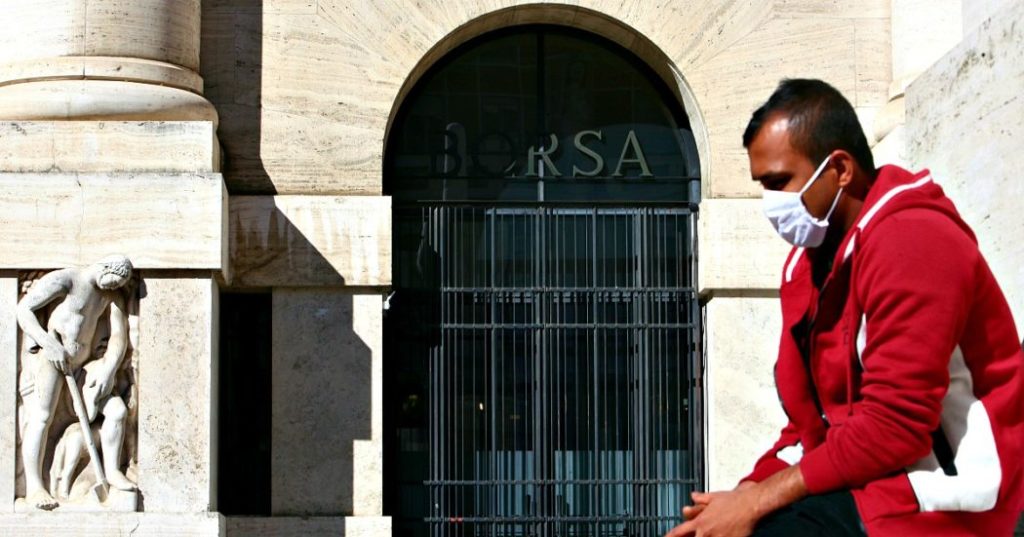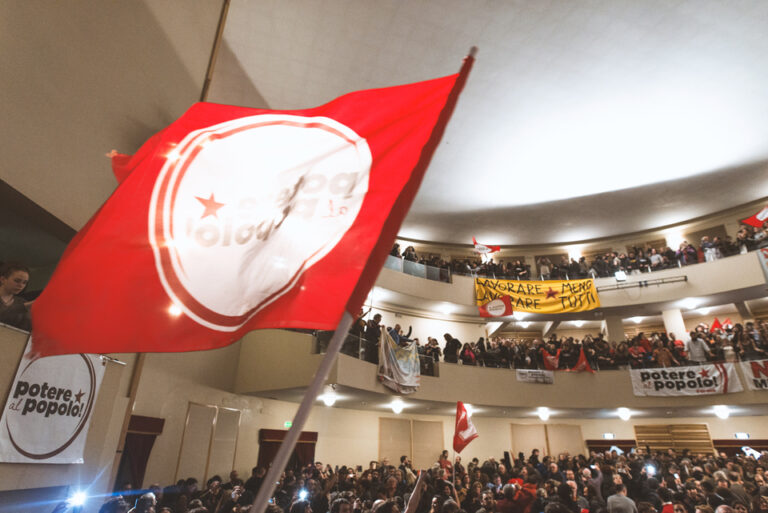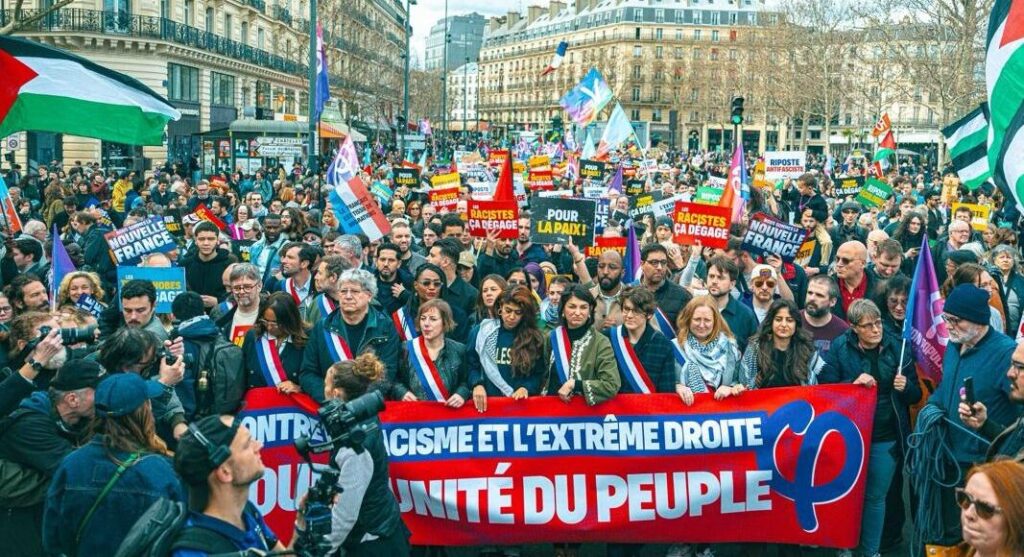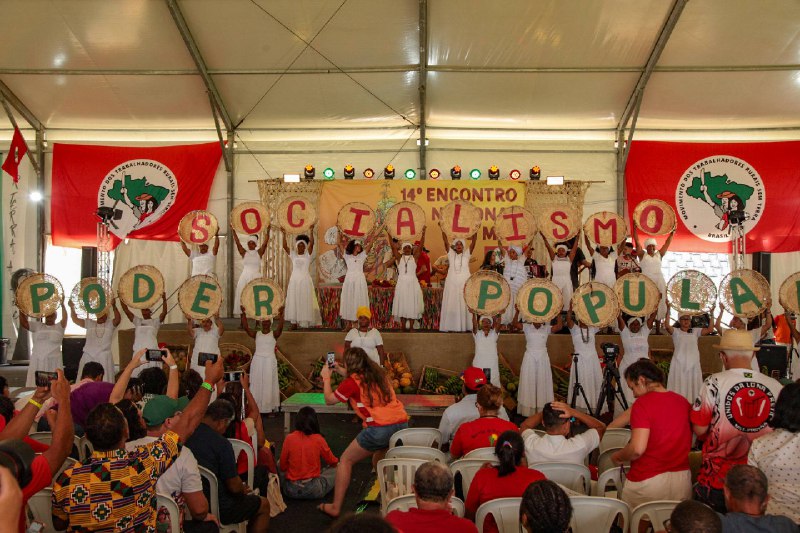Pubblichiamo la traduzione in inglese di un’intervista a Giuliano Granato, membro del coordinamento nazionale di Potere al Popolo, e a Iacopo Chiaravalli, attivista di Potere al Popolo a Padova.
L’intervista è disponibile sul sito serbo “Masina”
1) What are the reasons for the spread of the virus in Italy? What have happened to the healthcare system?
There is not a unique and easy answer to these questions. Especially because the spread of the virus is directly connected to the previous and actual situation of the National Healthcare System.
Let we begin saying that – generally speaking – the situation of the healthcare system in Italy is better than in other countries. Our healthcare system is mainly public, controlled by the state. Obviously this does not mean that its best organisation is granted. In specific, during the past 30 years the disastrous neoliberal politics of the right and the supposed-to-be left government changed the rules of the play. Although it is a public institution, every single hospital or healthcare structure is now considered as a kind of firm with a fixed budget. This budget is calculated not on the basis of the general potential necessity, but on the number of patients of the previous year as if they were the “profits” of the “healthcare firm” and the budget was the stock in order to reproduce them.
This new parameter permitted the closure of many little hospitals all around the country and the cuts for all the other structures and activities. What does this mean? First of all, less doctors and nurses, and fewer beds for the patients (3,8 per 1.000 citizens, with the obvious consequence of the extremely long time of answer of the our system to the ordinary demand of service). This involves that the public system should find an ally in the private sector, creating a huge discrepancy between who can afford it and who cannot. Furthermore, the weakening of the public healthcare system and the growing importance of the private sector enlarged another gap already present, that between the situation of the healthcare system in the North and in the South of Italy. Last but not least, the continuous and insane cutting of the budget caused the dismantling of the sanitary prevention system outside the hospitals, which is particularly important in case of contamination. This was – in broad terms – the situation before the beginning of the emergency. The bad condition of our National Healthcare System and the delay in employing new nursing and medical staff, as well as the absence of the needed equipment were surely the main cause of the fast spread of the virus.
In addition to this, we have to list some other more contingent factors. Firstly, the diffusion of the virus starts in the area between Milan and Venice, which is one of the most industrialized area in Europe, where people daily commute on a heavy frequency. Secondly, the general absence in Italy of a specific treatment for the early covid-19 patients that had chance to infect other people without the possibility of following the lines of spreading. Consequently the hospitals became one of the biggest pools for the virus.
The picture would not be complete if we do not talk about the other main cause of the dramatically quick diffusion of the Covid-19 among the population, i.e. the behaviour of the dominant class. Generally speaking, Confindustria – the representative authority of the owners of the means of productions – has tried to delay as much as possible the stop of the productive branch. Under their pressure the government decided first the closure of the non-productive activities (shops, bar, restaurants, etc.) and only 10 days ago that of the productive branch of Italian economy. At first glance it could seem a victory, even if the delay was massive. Actually it was a great result that the government declared the stop of the most part of the industries. Nevertheless the government decree presented a tricky distinction between essential/necessary and unessential/unnecessary activities. What is supposed to be an essential activity? The government listed four necessary sectors: agricultural/farming, energetic, logistics/transportation and telecommunications. Therefore, potentially every single activity that shares a small percentage of its production related to those sectors is to be considered “essential”. The productive participation of the single firm can be attested by its owner who can easily manage to continue or to convert the production without much troubles as the truth of their declaration will be verified by the state only in a vague future. According to a recent study the 40.3 % of the population still at work should stay at home[1]. It seems almost redundant to say that keeping industries open in this situation is extremely dangerous for the health of the workers and helps the virus to survive. But we can say more. As already said, the most critical situation at the moment is localized in the area between Milan and Venice, more specifically in the district around the city of Bergamo. Here the declaration of the area of containment and the quarantine were delayed under the pressure of the local industrialists.
2) How do workers accept the measures taken by the Government? Do they abide by the bans and do they go to work?
Due to different types of contract the job market has been tragically fragmented in Italy and consequently the working class is not all at same level. The economic decree of the government provides for different forms of economic help according to the different categories of the workers. Anyway, what is quickly spreading together with the virus is a general fear concerning the future working situation. The workers at home are really scared by the possibility that they could be the victims of other cuts. Those who are still at work are scared too, but for different reasons. Some days before the government ordered the closure of the unessential productive activities, the workers independently from trade unions stroke in many big factories. Their goal was the possibility to stay at home without the risk of being sick or becoming a vector of the virus for their families. The protests continued after the decision of the government, especially because – as already said – a lot of unessential activities are still open. In this sense we could say that apparently the workers are using the legal-formal weapons against the dominant class, striking and protesting for a full realization of the government measures. At the same time, workers are using the “weapons of the weak”: they are asking for a medical declaration stating they have to stay at home, “broadening” the range of the sick pay, which they have the right to. In many cities several companies had to shut down because there were too few workers, since most of them where on sick pay.
3) How does your party behave in this situation? Is it not possible to organize rallies / protests, is there no physical support for workers, and are some actions still possible?
It was impossible for us to foresee a situation like the present. We had and still now have to find out a solution day by day, trying to elaborate in the meanwhile a strategy of action for the long run. Nevertheless we reacted positively to the emergency. According to our usual strategy, which has its most powerful weapon in the solidarity with and among workers, we created forms of material supports for workers and people in general. Every local section has its own decisional independency, but we coordinated a national action based mainly on two supporting tools. The first one is what we call “Red Phone”, i.e. a national phone-number thanks to which workers in troubles can find legal advice and help. The second are different local phone-numbers. People can turn to us in order to solve the main problems of their lives in this period (for example, workers with their children at home). We try to put us at the disposal of the working class.
With the quarantine is extremely difficult to organize protests or rallies. We could say that it is impossible if we mean the classic form of a rally where there are massive amounts of people in the streets. An important part of our task at the moment is inventing new strategies in order to support workers. Till today we are managing to do so on the internet, whose importance is constantly increasing. We organized two different web campaigns: the first one supporting workers in our hospitals without the needed minimal security conditions, while the second supporting the strike against the unessential activities still open. Both of them were a success.
Nonetheless, probably we are going to face an increasing repression. Strikes are being banned until 30th April and government and bosses are trying to implement new measures in order to prevent social struggles, in the workplaces as well as in the cities. In many of our cities, army has been unfolded. They have a double task: controlling citizens, who have to respect governmental decrees; and, looking to the next future, being able to prevent any possible riot.
4) In all likelihood, another serious crisis of the capitalist economy follows. Is the Left more prepared to respond than it was in 2008? What is to be done?
Another serious crisis is already here. It is a hard challenge to say if the Left is more prepared to respond. What we have to underline firstly is that the field of the Left changed its face. The 2008 crisis caused the explosion of the traditional “left” wing. Here in Italy, the parliamentary “Left” – the Democratic Party – showed how much it was far from the working class giving full realization to the neoliberal plan of the dominant class. It is the main responsible for the destruction of the Italian welfare state, including the healthcare system. Therefore it is completely discredited in front of the people, while the Right rose up quickly in the few past years. On the other side, the 2008 crisis caused the explosion of the extra-parliamentary militant Left. Saying something not too far from the truth, we could state that our organisation rose in order to escape both of these disastrous alternatives. In the past two years we tried to create a web of “Case del popolo” (literally, “Houses of the People”) in order to connect different struggles and reorganize the working and popular classes. The work is hard and the results of our strategy can be seen only in the long run. Surely our party is a weapon more in the hands of the proletarian class.
5) What about possible turmoils denounced by Italian authorities?
The crisis is not only about our people’s health. We are also suffering a social and economic crisis. With many economic activities rightly closed according to govenrmental decrees and thanks to the struggles of many workers, entire families are without any kind of income.
In Italy we have an estimated 3.7 million people in the “informal” job market. It means millions of people cannot survive on the benefits provided for by the governemnt at the time of coronavirus crisis. The situation is very critical in the South. According to official data, the biggest city, Napoli GDP is based on these activities for its 30%. An army of workers with no contract, with daily contracts, involved in extra-legal activities (it doesn’t mean criminal activities!), who, from on day to another, is without any income. Poor people, most of them with zero or very few savings to use during these periods. So in Napoli, Palermo, Bari, but also in small towns in the North of the country, different people started to go to the supermarkets, buying food (bread, milk, pasta, tomatos, etc.) and refusing to pay. “We have no money to pay for this food” – it’s the sentence which is possible to hear from videos which got viral on the social networks. They have been accused of being used by “mafia”, but the truth is that there is a social discontent which is growing day after day. Secret services advised the government there is a chance of turmoil in the South and autorithies have started to fund with 400 millions the city halls in order to feed the poor people, excluded from previous aids.
[1]Cfr. M. Gaddi and N. Garbellini, Settori fondamentali: li stiamo identificando nel modo giusto?, Fondazione Claudio Sabatini. You can find this relevant study at the following link: http://www.fondazionesabattini.it/ricerche-1/ricerca-coronavirus-e-lavoro



